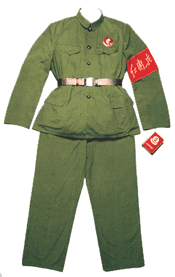










|
|
When completed, this section will include posters, photographs,
and footage showing Red Guards in uniforms, as well as old PLA
uniforms from the 1940s.
As young middle school and university students in Beijing began to
rebel in 1966, they looked to the traditions of the 1949 Revolution,
and particularly to the army, for inspiration. One group of Beijing
student rebels decided to call themselves ‘Red Guards’,
hong weibing, and they saw themselves as soldiers
(bing) who were fighting to protect (wei) the
Revolution and Mao thought (represented by the word
‘red’ or hong).
|
The new revolution of 1966 was also a nostalgic
retro-revolution, one that expressed a longing, in both Mao
and the Red Guards, for a lost era of revolutionary ardor,
purity and enthusiasm. For Mao much of the impetus of 1949 had
been stymied by the stolid bureaucracy of the socialist
state—run by the men and women who were now identified
as ‘people in power taking the capitalist road.’
For the Red Guards, the educational system itself undermined
the revolution that had once transformed China; a new
revolution in education would be the start of national renewal
and salvation.
In their reenactment of the 1949 Revolution, Mao's new
revolutionaries rehearsed the history of the original army
controlled by the Communist Party. During July and August of
1966, old army uniforms, broad leather belts, arm bands and
military caps became popular among the Red Guards and other
middle-school students as a sign of their revolutionary
purity, and as proof of their impeccable family background.
(Many of the Red Guard uniforms were faded because they had
originally been worn by their parents during the 1949
Revolution.)
|

|
|
© Long Bow Group, Inc. All Rights Reserved.